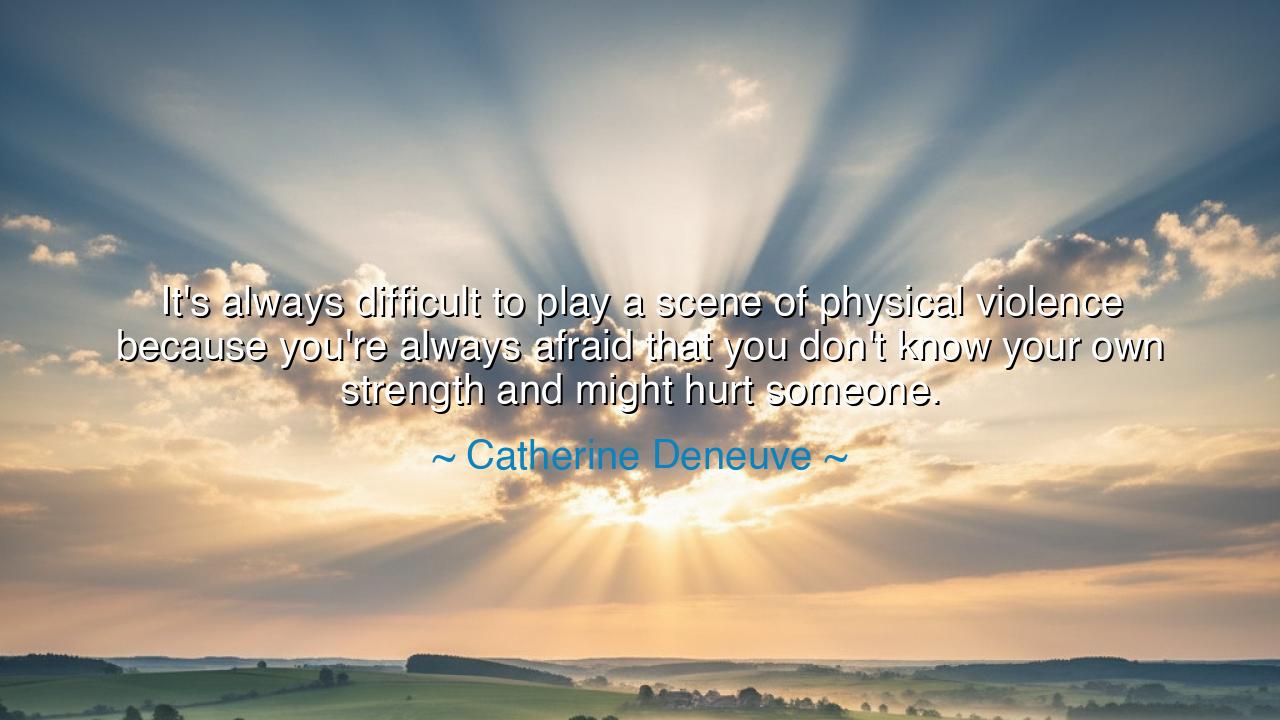
It's always difficult to play a scene of physical violence
It's always difficult to play a scene of physical violence because you're always afraid that you don't know your own strength and might hurt someone.






Hear the words of Catherine Deneuve, a voice of elegance and mastery in the art of cinema, who confessed: “It’s always difficult to play a scene of physical violence because you’re always afraid that you don’t know your own strength and might hurt someone.” In this thought, uttered from her long years before the camera, there is more than technique—there is wisdom about the human condition. For the stage, though it is illusion, still touches reality. And when a hand is raised in anger, even in play, the danger is real. The line between art and harm is fragile, and only humility preserves it.
The meaning is twofold. First, it speaks to the actor’s craft: to embody rage, to display struggle, to strike convincingly without striking truly. Yet beneath this lies a deeper current—an acknowledgment that our strength often exceeds our awareness. In moments of passion or haste, whether in art or in life, a gesture meant to mimic may wound, and an act intended as form may break the body or the spirit of another. The lesson is not only for the stage, but for the theater of life itself.
The ancients too knew this danger. The Spartans trained their youth to fight with control, for they taught that unrestrained power is more dangerous to friend than foe. In the Roman arenas, gladiators who struck without measure often fell by the weight of their own excess. To master one’s strength was the mark of discipline, and discipline was the measure of civilization. Thus Deneuve’s reflection stands in the same lineage: the awareness that violence, even when feigned, must be handled with reverence.
Consider the story of Brandon Lee, son of Bruce Lee, who perished during the filming of The Crow. What was meant to be illusion—an artful performance of gunplay—turned into reality when a weapon mishandled brought death. It was a tragedy that reminds us of Deneuve’s caution: in the delicate craft of simulating violence, one misstep, one oversight, can bring harm more lasting than any scene upon the screen. Art touches life, and with life must come responsibility.
The meaning stretches further still: in our everyday encounters, words and gestures may seem like play, but they can wound more deeply than intended. Just as the actor must guard against harming a fellow performer, so too must we guard our interactions with those around us. The force of our own strength, whether physical, emotional, or verbal, is often greater than we know. And if unchecked, it can do harm we never wished to cause.
The lesson is clear: strength must be tempered by awareness. Whether in art, in labor, in speech, or in the passions of the heart, we must know the weight of our own hands and voices. To act without reflection is to risk injury, even when no harm is intended. The wise do not deny their power, but they learn to guide it with care, ensuring that their presence builds rather than destroys.
What, then, are the practical actions? In the theater: train well, respect the craft, and place safety above spectacle. In life: pause before acting in anger, measure your words before unleashing them, and remember that your strength—whatever its form—can either protect or wound. Cultivate discipline, gentleness, and restraint, so that your power is a blessing, not a danger.
Thus Deneuve’s words become more than an actor’s reflection; they are a parable for life: “It is always difficult to play a scene of violence, for you may not know your own strength, and you may hurt another.” Take this to heart, O seeker. For the true art of living is not merely in expressing passion, but in doing so with such care that your power uplifts rather than harms.






AAdministratorAdministrator
Welcome, honored guests. Please leave a comment, we will respond soon